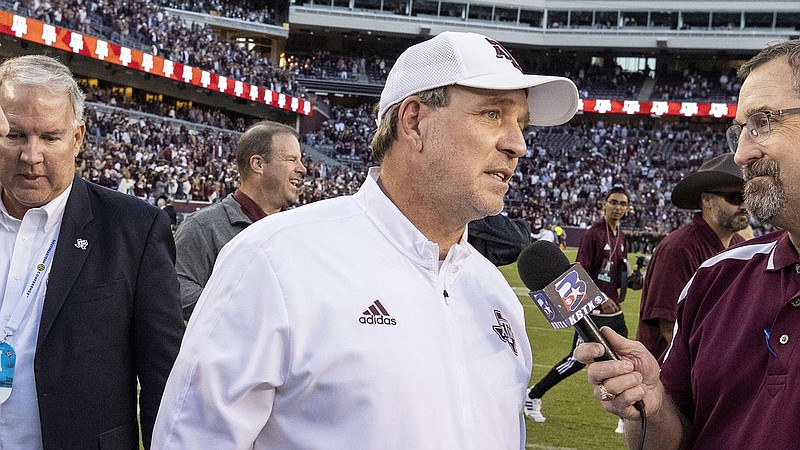With its players having the opportunity for revenue, the looming 12-team expanded playoff and without clock stoppages after first downs, college football is becoming more and more like the National Football League every day.
One notable difference between the two is the injury report, which is a weekly requirement for NFL teams but simply the spoken word of the college coach, whether he chooses to be truthful or not. The college method or lack thereof is under a microscope more than ever before due to the exploding legalization of sports gambling.
“The simple solution of we wanting an injury report is not what I’m going to talk about,” Southeastern Conference commissioner Greg Sankey said during a news conference this week at the league’s spring meetings in Destin, Florida, “but as information becomes more and more in demand because of the increases in sports gambling, we’re going to have to think about a sophisticated response to managing our information.
“We’re not even close to sending out an injury report every Wednesday, but we’re watching a change, and we’re going to have to adapt to that change.”
According to Action Network, sports betting is legal in 33 states, with 24 offering it online. Arkansas, Louisiana and Tennessee are the three states within the SEC footprint that offer online gambling, while Mississippi is among the nine states nationally that allow it in person, with the Magnolia State doing so within its casinos.
The NFL outperforms every other sport for sports betting operations each year in the United States, according to legalsportsbetting.com, which claims that roughly $100 billion is wagered at licensed sportsbooks during the NFL season. College football, according to the site, can generate “hundreds of millions for sportsbook operators throughout the year.”
“It’s certainly a big business,” South Carolina coach Shane Beamer said, “and it’s not something to where we can just go bury our heads in the sand like it’s not going on around us.”
Beamer said the league’s football coaches sat through a two-hour presentation on gambling Wednesday morning. The SEC was rocked nearly a month ago when Alabama baseball coach Brad Bohannon was fired after allegedly informing someone he knew that Crimson Tide ace pitcher Luke Holman was going to be scratched due to back tightness before a game against LSU.
An injury to a star player can affect a betting line and sometimes significantly, but there is no established system in college athletics to provide health updates.
“If everybody is giving an injury report, I have no problem giving an injury report,” Georgia coach Kirby Smart said. “They do it in the NFL. I’ve coached in the NFL. That’s not a huge deal as long as it’s a level playing field. A lot of the issues in college sports today are because of an imbalance because one state has this and another state has this.
“We need somebody to come along and say, ‘This is how it’s going to be done, and everybody adhere to it.’”
The NFL requires that each of its 32 teams “must ensure that all medical information issued to the media is credible, responsible and specific in terms that are meaningful to teams, media and fans.” An arm injury in the NFL must be specified as the shoulder, elbow, wrist or hand, while a leg injury must be detailed as the ankle, knee, thigh or calf.
NFL teams must provide injury reports for three days leading up to games, with players being labeled as full participants in practice, limited participants or that they did not participate.
“The NFL is the best sports league, in my opinion, in the world for a reason,” Missouri coach Eli Drinkwitz said. “The more that we can streamline to some of these things the better. We’ve already moved away from a collegiate model to more of a business model, and we provide an injury report every Thursday.
“We don’t have to, but that’s what we believe in doing.”
Ole Miss coach Lane Kiffin is not nearly as convinced that injury reports are necessary, saying, “You’re going to solve a few problems and create a lot more with that.” Kiffin’s first head-coaching role was with the NFL’s Oakland Raiders in 2007.
And while Kiffin and Texas A&M counterpart Jimbo Fisher haven’t always seen eye to eye on the name, image and likeness issue, they do seem in concert on this one.
“It’s amazing how the folks who gamble already know it before any injury reports are out,” Fisher said. “They have all their avenues of knowing. They know stuff sometimes before we know stuff, as crazy as that sounds.
“College kids are a lot more vulnerable than pro kids. They’re out going to class, and with who all they talk to in casual conversations, it’s easy to get some information.”
Arms race over?
Arkansas football coach Sam Pittman when asked Wednesday whether newer and nicer facilities are as important now in the NIL landscape: “I’d say that if you’ve got enough money, they’d be happy living in a tent.”
Contact David Paschall at dpaschall@timesfreepress.com.
